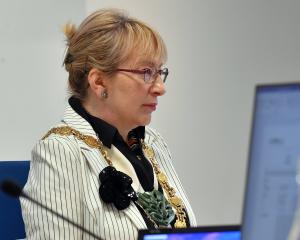
Cr O'Malley, who announced on Monday he would run for mayor, cited a commuter train service between Mosgiel and central Dunedin as one of his priorities.
The service would target the 40,000 commuters driving into the city from the south each day, reducing the city's worsening traffic congestion as well as its carbon footprint, he said.
Cr O'Malley had floated the idea last year, prompting Transport Minister Phil Twyford to suggest the council develop a business case for the next regional land transport plan.
Contacted again yesterday, Cr O'Malley conceded work on a business case had ''stalled'' since then - but not for lack of interest.
He met representatives of KiwiRail, Dunedin Railways and Dunedin City Council staff earlier this year for a scoping meeting, which concluded a trial was ''potentially a goer''.
Dunedin Railways had also expressed interest in operating the new service, using a leased railcar, he said.
Dunedin Railways chief executive Craig Osborne confirmed that yesterday, but cautioned talks were preliminary and data had not yet been analysed.
''We have an open mind to looking at all propositions. We are in the business of trains,'' he said.
However, Cr O'Malley said the business case had not progressed far since then, mainly due to a lack of resourcing for the work.
At least $10 million would also be needed for infrastructure improvements, including double tracks in places along the railway line and a temporary platform at Mosgiel, he said.
That could come from the NZ Transport Agency - which had funding for the transition to urban and inter-regional rail services - as well as from the DCC and other parties, he said.
He wanted Dunedin to receive a ''proportional'' share of NZTA's funding, but a lag in census data highlighting the city's recent growth made the argument more difficult, he said.
He now hoped to make the case directly to NZTA and Ministry of Transport officials, and hoped any trial could be up and running in two years' time.
Any service could eventually expand to include stops at Wingatui, Green Island, Fairfield, Forsyth Barr Stadium and Port Chalmers.
Cr Aaron Hawkins - the only incumbent councillor confirmed to challenge Cr O'Malley for the mayoralty - supported a more detailed investigation but cautioned against rushing in.
The city's bus network already provided a public transport system and he would prefer to see further improvements rather than ''setting off on a significant commuter rail investment''.
''I don't think we should discount anything out of hand, but nor should we go chasing alternatives to any significant degree before having a better understanding of what the implications would be financially.''
KiwiRail sales and commercial executive general manager Alan Piper said KiwiRail was ''always interested'' in viable new services, in collaboration with NZTA and regional councils.
Such services were promoted by regional councils and funded by NZTA, while KiwiRail acted as a supplier, but no costings for a Dunedin service had been done and KiwiRail was ''not currently involved in any discussions about a prospective service''.
ORC transport manager Gerard Collings, asked to comment yesterday, would only say the council had not investigated the idea ''to date''.
Comments
Another massive blackhole in the making (to be paid by you the rate payer). If it is such a great idea- use 2 carriages from the Taieri Railway with 1 engine and see how many would take it for say $5 each way. No need for massive spending. After a month we would know the real answer.
But why test when you can spend our money in the $ millions. The answer is there in nearly every large city, let alone small city. There is no profitable demand for such a service.
It was the 'Dunedin Suburban', and worth setting up again.
Any kind of ‘think big’ is too risky for a city with a debt of $215 million and an ageing population of retiring baby boomers, most of whom will be on fixed incomes and unable to manage still further rates rises. No, we don’t have reliable census figures but I reckon building permits issued would show any significant population growth is in Queenstown Lakes rather than in Dunedin. Rail needs a lot of money up front but public bus services can respond to need as required and also vary routes, while rail is fixed route. Bogotá, in Columbia, created a world class rapid transit system which revolutionised the city and especially benefited the poor and that was all done with buses.
Diane, the debt as of June 2018 was $580m plus, per the group/consolidated financial statements of the DCC. The DCC intentionally does not publishes this in their press releases for good reason. It focuses on 'core' activities, BUT we the ratepayer is on the hook for all of it.














